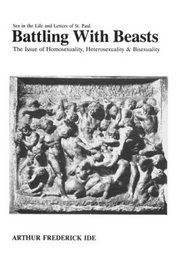The GLBTRT has been reviewing books and movies in its newsletter since the early 1990s. Trace the evolution of queer publishing through these historic reviews. This review was originally published in Vol. 4, No. 4, Winter 1992.
This is Dr. Ide’s response to evangelical fundamentalism. Tying onto the coattail of Bishop Spong’s Rescuing the Bible From Fundamentalism, Ide goes further than Spong in his examination of Paul’s sexual objections by presenting an argument that Paul did not condemn homosexuality, but sexuality in general.
Ide believes that Paul was so uncomfortable with his own sexual identity and propensity that he demanded others cover theirs and adopt his own paranoia. Paul’s cry was thus, not a cry for people to deny themselves a homosexual life style or proclivity, but it was more a passionate – pathetic- plea for heterosexuals and homosexuals to give up lust, to deny themselves sexual stimulation, gratification, reproduction and physical intimacy.
Dr. Ide’s work is an interesting and scholarly reexamination of the human side of St. Paul. It allows the reader an inside view into the weaknesses of Paul, and how important it is to remember the humanness of all the Apostles.
The text is filled with numerous footnotes and lengthy passages in Greek. As a limited reader of Greek, this reviewer found them at best interesting and at times, a challenge to one’s ability to concentrate on the thesis of the argument presented in English. Because of this factor, the common reader may perhaps ignore entire sections of the work, or even worse, lose interest in the text altogether. From a scholar’s or researcher’s point of view, the Greek references do serve as good documentation for the skeptic who would question the validity of Ide’s thesis or scholarship.
Because of the level of scholarship of this work, it is not recommended for the lay person. It is more directed to the advanced theological student, seminarian, or theological scholar.
Reviewed by Charles Whitlow
AT & T Tax Administration
Morristown, NJ

